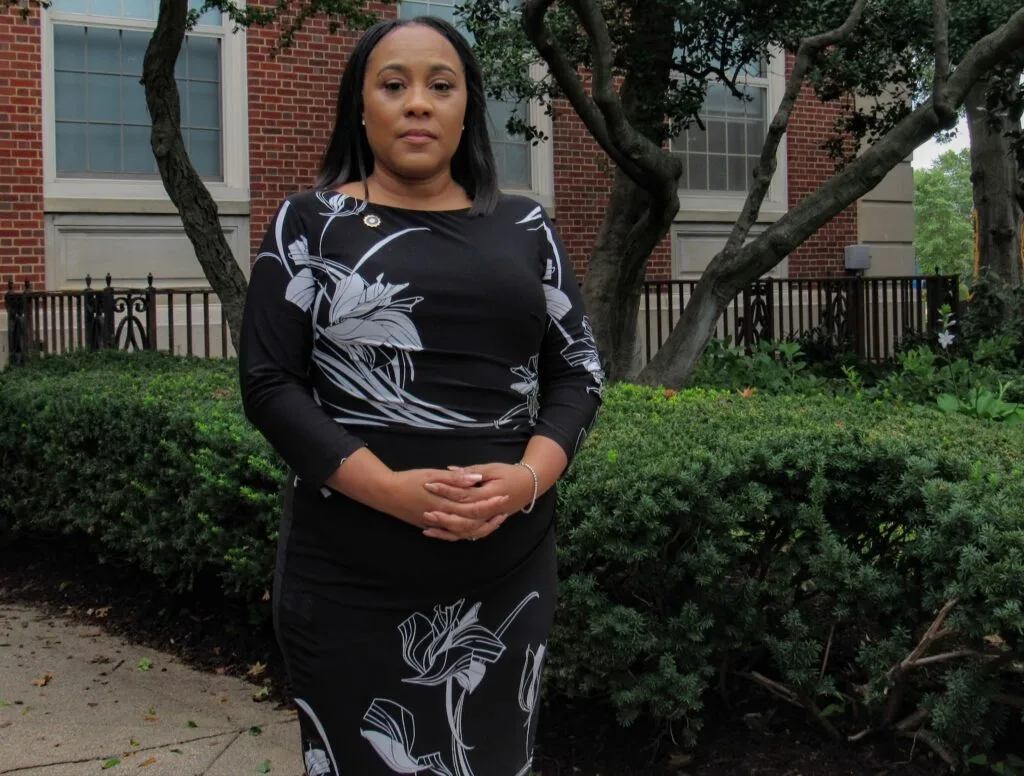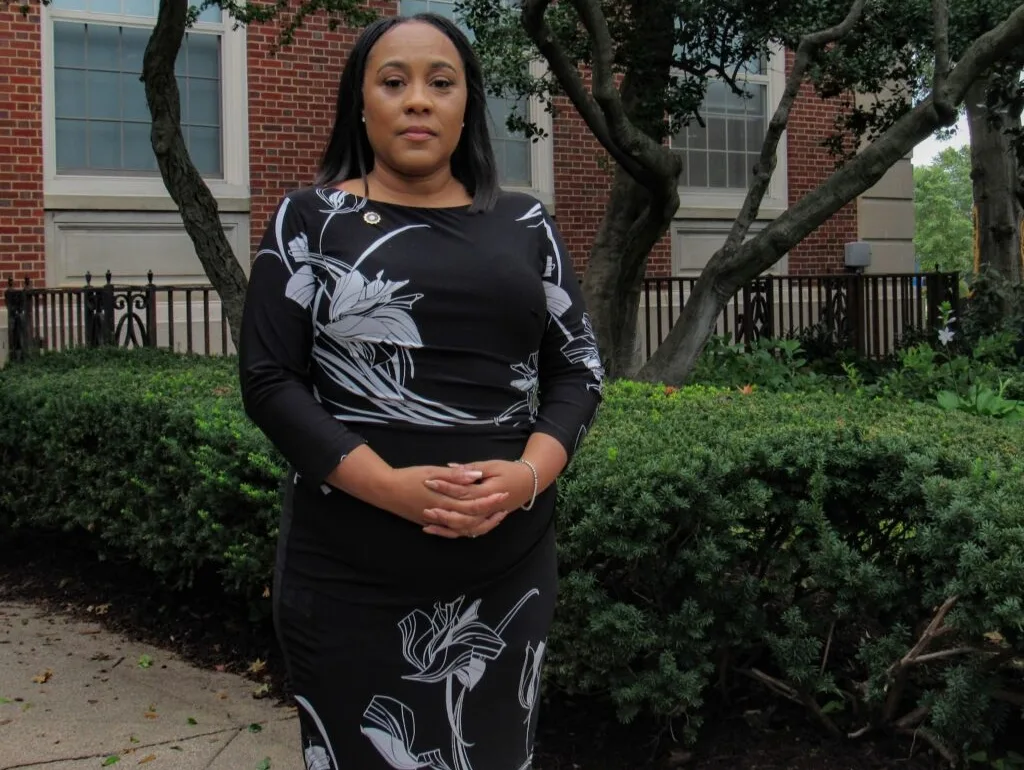
At 20 years old on Capitol Hill, Fani Taifa Willis was lobbying the nation’s lawmakers.
Her 1991 internship, provided by Howard, tasked Willis with persuading congresspeople to invest in the nonprofit that employed her. What she learned in this role helped shape her more than 25 years in the legal profession.
“That has benefited me to this day because I still feel confident about communicating with different people,” Willis said. “Understanding that I was smart enough to have those conversations and deserved to be in the room, and also because I had the knowledge where we could exchange ideas, and I could persuade them to do what I needed them to do.”
Now the first woman to be district attorney of Fulton County, Georgia, which is home to 15 cities, including Atlanta, Willis continues to exercise her skills in communication and persuasion as a prosecutor. In early 2022, Willis announced a criminal investigation into former U.S. President Donald Trump which, on Aug. 14, resulted in an indictment. Willis informed The Hilltop she would be unable to discuss any open investigations.
Though the indictment has brought much attention to Willis and her office, she emphasized that her experience with her dad and as a Howard student helps her to stay grounded in her work and in herself today.
Willis’ journey at the Mecca began in the Harriet Tubman Quadrangle dormitory, where she resided during her freshman year. She went on to stay in the late Slowe Hall during her sophomore year before moving off campus as an upperclassman, like many of her fellow Bison.
While studying political science, Willis became intrigued by the challenging coursework. Her unwavering desire to pursue law was inspired by Howard’s esteemed faculty, such as Dr. Alvin Thornton, who served as the pre-law advisor of the political science department during her matriculation.
“I had known since I was a child that I wanted to go to law school, but Dr. Thornton really had me thinking in a different direction and I even considered things like city management,” Willis said.
Throughout his career, Thorton worked on Capitol Hill with Congressman John Conyers Jr., served as the three-time chairman of the Prince George’s County Board of Education and spent decades working at Howard before leading the university’s political science department as interim chair.
Thornton expressed the immense pride he felt seeing Willis make her mark in history. “A great percentage of those who have done anything to advance democracy in America have sat in Douglass Hall as Fani did,” he said.
He explained that Howard’s political science department seeks to embed students with the same social justice ethos and knowledge of jurisprudence that drove the civil rights movement, and Willis serves as an excellent example.
Willis said that her attraction to the law was very strong. Having grown up with a hardworking single father, legendary criminal defense attorney, John C. Floyd III, Willis developed a passion for public service at a very young age.
She spent many weekends organizing her father’s office and sorting through files, and many of her weekdays were spent tagging along with her father in court.
Willis recalled her father would often visit his clients in jail or prison during the Christmas holiday. “He knew that [during] that season, they would be at their very lowest point,” Willis said.
“It was important that his clients knew he was not only fighting for them, but he cared about them,” she said.
Not only did Floyd instill a burning desire for public service into his daughter, but he also largely influenced her decision to attend Howard.
Floyd grew up on the West Coast in an impoverished family, which made attending an HBCU an extraordinarily difficult dream for him to accomplish. When it came time for Willis to go to college, Floyd said she must choose an HBCU.
“If you are going to go to college, you should go to the best college in the country—Black, white or otherwise. So, [choosing] Howard was easy,” the Inglewood, California native said.
Following her matriculation at Howard, Willis decided to pursue her Juris Doctor degree at Emory University School of Law in Atlanta. Although she initially considered Howard University School of Law, Willis expressed that she was excited to study in the honors program at Emory.
“I’m very grateful for my foundation, which will always be here at Howard, ” Willis said, sharing that she will never forget the integral role Howard plays in developing Black professionals in every field.
“There is no group that I would want to make proud of me, more than Howard alumni,” she said.
Willis’ decision to stay in Atlanta partially stemmed from conversations with Dr. Thornton, who advised that she choose a city to settle down in. Willis explained that economic interests were motivating factors due to her desire to work as a public servant and raise her two daughters comfortably.
“Children become what they see and I understand it is very important for youth to see examples [of] Black excellence,” Willis said, expressing her love for the city and her joy of raising her daughters among a community of Black professionals.
As Willis began practicing law in Fulton County, she remembered and evoked the significant lessons she received from her father as well as the unique foundation she established while studying at the Mecca. With an appreciation for the experiences and tools that have prepared her, Willis seeks to impart wisdom to a new generation of attorneys.
“I teach the prosecutors, investigators and legal assistants that report to me that the minute they look at our work as just files, they need to find a new job,” Willis said. “In each file are people’s lives that have been impacted. I would rather lose a case than wrongly prosecute someone.”
Willis admitted that while studying at Howard, she could have never imagined being a prosecutor. In fact, she initially intended to follow in the footsteps of her father to become a defense attorney.
“I realized prosecutors are not [necessarily] better lawyers, but power is truly in their hands,” she said.
Willis emphasized it is very important that legal representatives view Black people as human beings.
While Willis expressed admiration and support for public defenders and encouraged students to pursue careers in criminal defense, she also emphasized the invaluable and essential role of good prosecutors.
“I’ve helped more people than any criminal defense attorney ever would, because of the position I occupy,” Willis said.
She hopes that aspiring lawyers will consider working as a prosecutor as a career pathway to the table of justice, where they can help more people.
Willis is the first woman to serve as district attorney of Fulton County and has led several landmark prosecutions. As a result of her prominent work, in many instances, Willis has received harmful threats and racist backlash due to her efforts to prove that no one is above the law.
Willis said that she is a proud Black woman and worked tirelessly to be in her current role. “I am prepared for challenges and unbothered by ignorance,” she said.
She shared a recent experience in which she accepted an interview from a right-wing media outlet and believed they made futile attempts to trick her. Nevertheless, due to her innate honesty and Howard-grown confidence, Willis was prepared.
“You’re not going to be able to trick me because you always get the same Fani [and] I don’t change if I’m in a room with [majority] African American people, or Caucasian people,” Willis said. “If I’m the only woman in the room, I stay the same. Due to my authenticity, my answers don’t change. People may not like my answers, but they are consistent because I speak from a point of truth.”
Thorton mentioned that given the pressures and personal threats that Willis has endured, it is very difficult for a local prosecutor and essentially, a county, to hold accountable some of the most powerful people in the country.
“She’s working with such adaptiveness and excellence, I’m just so proud of her and deeply honored that she remembers me,” Thorton said.
Willis encouraged students to be kind to everyone they interact with and to foster strong connections with alumni. She stressed the importance of internships and extracurricular activities, recounting her experiences.
“Work really hard and do more. Don’t do less, try to do more,” Willis said. “You’re never going to have the opportunity to concentrate on education, learning, and growing the way you do during this special time in your life.”
Willis also advised current Howard students to build their network throughout their matriculation at the university.
“The students at Howard with you today are going to be governors, presidents, lawyers and leaders of major corporations. It is very important to create those relationships,” she added.
Willis recalled important advice that she has followed throughout her career, hoping students and aspiring lawyers will heed the words as well.
“If you make the right decisions, the politics will follow. If I make decisions based on the law and the facts, I never have to worry about the rest,” she said.
Copy edited by Diamond Hamm



